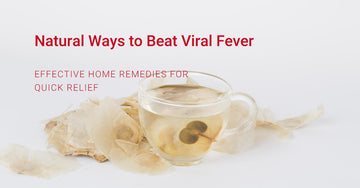Home Remedies Gone Viral: Beating the Heat of Viral Fever
by Swadeshi Ayurved on Sep 21, 2023

In our pursuit of a healthier and more robust life, we often encounter health challenges that test our resilience. Viral fever is one such adversary that can leave us feeling drained and unwell. But fear not, for we are here to share a trove of potent home remedies that have gone viral in the realm of natural healing. These remedies are not only effective but have also been endorsed by countless individuals who have successfully bid farewell to viral fever. In this comprehensive guide, we'll delve into these tried-and-true solutions that can help you overcome viral fever, regain your vitality, and get back to your daily routine. Let's embark on this journey towards better health together.
Understanding Viral Fever
Before we delve into the remedies, it's essential to understand what viral fever is. Viral fever is not a standalone illness but a symptom of an underlying viral infection. It typically manifests with symptoms such as high body temperature, body aches, fatigue, headache, and sometimes, a sore throat or cough. The fever occurs as a result of your body's immune response to the invading virus.
The Power of Hydration
One of the most crucial aspects of battling viral fever is staying well-hydrated. Proper hydration is essential to support your immune system as it fights off the virus. Make sure to drink plenty of fluids, including water, herbal teas, and clear broths. Coconut water is particularly beneficial as it not only hydrates you but also provides essential electrolytes to replenish lost nutrients.
Herbal Heroes: Ginger and Turmeric
Ginger and turmeric are two potent herbs that have been celebrated for their anti-inflammatory and antiviral properties. Incorporating these into your daily routine can help alleviate symptoms and boost your recovery. Here's how to make the most of these herbal heroes:
Ginger Tea
Ginger tea is a soothing remedy that can provide relief from fever-induced discomfort. To prepare it, simply:
- Slice fresh ginger into thin pieces.
- Boil water and add the ginger slices.
- Let it simmer for 5-10 minutes.
- Strain the tea and add a touch of honey for flavor.
Sip this ginger tea throughout the day to soothe your throat and reduce fever.
Turmeric Elixir
Turmeric, with its active compound curcumin, possesses remarkable anti-inflammatory and immune-boosting properties. Create a turmeric elixir by following these steps:
- Mix a teaspoon of turmeric powder with warm milk.
- Add a pinch of black pepper to enhance curcumin absorption.
- Drink this concoction daily to help your body combat the virus effectively.
Restorative Sleep
Amidst the chaos of daily life, we often underestimate the power of restorative sleep. When battling viral fever, your body needs ample rest to heal and recover. Ensure you get at least 7-8 hours of uninterrupted sleep each night. Create a comfortable and calming sleep environment to promote a deep and healing slumber.
Immune-Boosting Juice
Your diet plays a pivotal role in strengthening your immune system. Incorporate these immunity-boosting foods into your meals:
Citrus Fruits
Citrus fruits like oranges, lemons, and grapefruits are rich in vitamin C, a powerful antioxidant that aids in fighting off infections.
Garlic
Garlic is not only a flavorful addition to your dishes but also a natural immune booster with antimicrobial properties.
Leafy Greens
Spinach, kale, and other leafy greens are packed with vitamins and minerals that support your overall health.
Natural Steam Inhalation
Steam inhalation is an age-old remedy to alleviate congestion and ease breathing difficulties during a viral fever. Here's how you can do it:
- Boil water and pour it into a bowl.
- Lean over the bowl, covering your head with a towel to trap the steam.
- Inhale the steam for 5-10 minutes, taking deep breaths.
This practice can help clear nasal passages and provide relief from respiratory symptoms.
How to reduce fever at home for child
-
Keep Them Hydrated: Make sure your child drinks plenty of fluids to prevent dehydration. Water, clear broths, and electrolyte solutions (e.g., Pedialyte) are good options.
-
Dress Lightly: Dress your child in lightweight and breathable clothing to help with temperature regulation. Avoid heavy blankets or excessive layers.
-
Room Temperature: Maintain a comfortable room temperature. It's usually best not to overdress your child or keep the room too warm.
-
Use Fever-Reducing Medications: Over-the-counter fever-reducing medications like acetaminophen (Tylenol) or ibuprofen (Advil, Motrin) can help lower fever and relieve discomfort. Be sure to follow the dosing instructions for your child's age and weight. Consult a healthcare professional before giving any medication to a child under a certain age.
-
Sponge Bath: If the fever is high and doesn't respond well to medication, you can try a lukewarm sponge bath. This can help bring down the temperature gradually. Never use cold water or ice for a sponge bath.
-
Rest: Ensure your child gets plenty of rest to help their body recover.
-
Monitor the Fever: Keep an eye on your child's temperature regularly to track any changes. If the fever persists or worsens, consult a healthcare professional.
-
Seek Medical Attention: You should seek immediate medical attention if your child has a fever and shows any of the following symptoms:
- Difficulty breathing
- Seizures
- Stiff neck
- Severe headache
- Rash
- Lethargy or extreme fussiness
- High fever (above 104°F or 40°C)
- Signs of dehydration (dry mouth, fewer wet diapers, sunken eyes)
Always consult a healthcare provider for guidance specific to your child's condition. Additionally, if your child has an underlying medical condition or is very young, it's essential to consult a healthcare professional before administering any fever-reducing medication or home remedies.
How to reduce fever without medicine for adults?
Reducing a fever without medicine for adults primarily involves natural remedies and lifestyle adjustments to help the body fight off the infection or illness causing the fever. However, please consult with a healthcare professional if you have a persistent or high fever or if you're unsure about the underlying cause. Here are some methods to reduce fever without medication:
-
Stay Hydrated: Drink plenty of fluids, such as water, herbal teas, and clear broths. Staying hydrated helps your body regulate its temperature and flush out toxins.
-
Rest: Give your body the rest it needs to recover. Avoid strenuous activities, and get enough sleep to help your immune system work effectively.
-
Cool Compress: Apply a cool, damp cloth to your forehead, neck, and wrists. This can help lower your body temperature temporarily. Replace the cloth as it warms up.
-
Take a Lukewarm Bath: A tepid bath can help bring down your body temperature. Avoid using cold water, as it may cause shivering and potentially raise your temperature.
-
Wear Light Clothing: Dress in lightweight, breathable fabrics to allow heat to escape from your body more easily. Avoid heavy layers and tight clothing.
-
Stay in a Comfortable Environment: Keep the room at a moderate temperature. Avoid extreme heat or cold, as both can make you feel more uncomfortable.
-
Eat Light: Consume easy-to-digest foods, such as plain rice, applesauce, or toast (BRAT diet) and avoid heavy or spicy meals that can increase your metabolic rate.
-
Stay Cool: Use fans or air conditioning to maintain a comfortable indoor temperature.
-
Stay Calm: Stress can elevate your body temperature, so engage in relaxation techniques like deep breathing, meditation, or gentle yoga.
-
Monitor Your Temperature: Regularly check your temperature to track changes. If your fever persists or worsens over a few days, consult a healthcare professional.
-
Hygiene: Wash your hands frequently to prevent the spread of infection, and avoid close contact with others to reduce the risk of spreading illness.
Remember that fever is often a symptom of an underlying issue, such as an infection. It's essential to address the root cause of the fever, and if it doesn't improve or if other concerning symptoms develop, seek medical advice promptly. Fever can be a natural response to help the body fight infection, so not all fevers need treatment. However, if your fever is very high (above 104°F or 40°C) or persists for an extended period, consult a healthcare provider.
How to get rid of a fever in 24 hours?
Getting rid of a fever within 24 hours depends on the cause of the fever and your body's response to treatment. It's essential to remember that a fever is often a symptom of an underlying issue, such as an infection. While you may not be able to guarantee that a fever will completely disappear within 24 hours, you can take steps to manage and reduce it during this timeframe:
-
Stay Hydrated: Drink plenty of fluids, such as water, herbal teas, and clear broths. Staying hydrated is crucial as it helps your body regulate its temperature and supports your immune system.
-
Rest: Get plenty of rest to allow your body to recover. Avoid strenuous activities and try to relax.
-
Over-the-Counter Medications: You can consider taking over-the-counter fever-reducing medications like acetaminophen (Tylenol) or ibuprofen (Advil, Motrin) following the recommended dosing instructions for adults. These medications can help lower your fever and provide relief.
-
Cool Compress: Applying a cool, damp cloth to your forehead, neck, and wrists can help temporarily reduce your body temperature. Replace the cloth when it warms up.
-
Lukewarm Bath: A tepid bath can help bring down your body temperature. Avoid using cold water, as it may cause shivering and potentially raise your temperature.
-
Light Clothing: Wear lightweight, breathable clothing to allow heat to escape from your body more easily.
-
Eat Light: Consume easy-to-digest foods, such as plain rice, applesauce, or toast (BRAT diet), and avoid heavy or spicy meals that can increase your metabolic rate.
-
Stay in a Comfortable Environment: Maintain a moderate room temperature. Avoid extreme heat or cold.
-
Stay Calm: Stress can elevate your body temperature, so engage in relaxation techniques like deep breathing, meditation, or gentle yoga.
-
Monitor Your Temperature: Regularly check your temperature to track changes. If it remains high or if you experience other concerning symptoms, seek medical advice.
Keep in mind that the fever may not completely disappear within 24 hours, especially if it's caused by a severe infection or another underlying medical condition. The goal is to manage and reduce the fever while allowing your body to heal. If your fever persists, worsens, or if you experience severe symptoms, it's crucial to consult a healthcare professional for a proper diagnosis and treatment plan. Fever can be a natural response to help the body fight infection, so not all fevers need to be aggressively reduced unless they are causing significant discomfort or other complications.
Viral fever treatment at home?
How to reduce fever in child naturally at night?
Indian home remedies for fever in child?
How to break a fever fast in a child?
Conclusion
In the battle against viral fever, these home remedies have gained notoriety for their effectiveness and natural healing properties. Remember that while these remedies can provide relief and support your recovery, it's essential to consult a healthcare professional if your symptoms persist or worsen.
As you embark on your journey to better health, stay hydrated, embrace the power of ginger and turmeric, prioritize restful sleep, and fuel your body with immune-boosting foods. Incorporate these practices into your daily routine, and you'll be well on your way to beating the heat of viral fever.
Remember, your health is your greatest asset, and these home remedies are your allies in the quest for a healthier, happier life.
- Diabetes prevention,
- Eucalyptus Steam Therapy,
- Garlic Benefits,
- Ginger and Honey,
- Health And Wellness,
- Healthcare,
- Healthcare Advice,
- Home Remedies,
- Immune System,
- Immune System Boost,
- Lemon and Honey,
- natural remedies,
- Natural RemediesAyurveda,
- Piles Prevention,
- Prevention,
- Turmeric Benefits,
- Viral Fever




